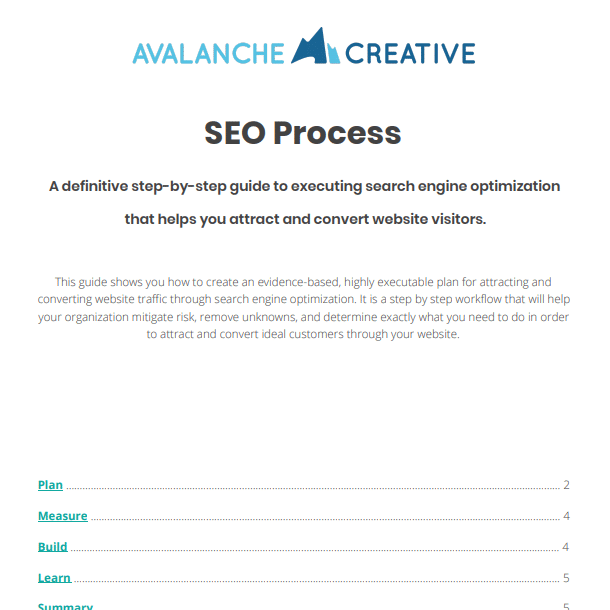Building Strategies for SEO for Higher Education
If you’re looking to build an SEO strategy for higher education, we have the advice to help you be successful. Talk to our team for even more information
Talk to the Experts on SEO for Higher Education

Ready to start building an SEO strategy for your college or university? Reach out to the team at Avalanche to learn how we can help your website get more actionable leads.

Category: Search Engine Optimization | Tags:
Search engine optimization can be a powerful tool for colleges and universities that are looking to attract students and staff through a great website. SEO can increase the visibility of your school, drive organic traffic to your website, and create more leads. An effective SEO strategy for higher education will also present your school as a thought leader that is brimming with helpful, informative content to build confidence in visitors to your site.
How to Build an SEO Keyword Strategy for Higher Education
One of the first steps to building strong SEO for your website is to identify the right keywords that potential visitors to your site will be using to search. An effective SEO keyword strategy for universities allows them to build helpful, relevant content that will keep people engaged with their site.
Competitive Analysis
SEO is a popular tool for schools and universities, which means that many of them will have already built up a strong strategy before you. Instead of trying to reinvent the wheel, a good strategy will draft off the successes of other institutions—while still identifying holes in their plan where you can get some quick wins.
Any SEO strategy we make at Avalanche Creative starts with a competitive analysis to see what keywords our competitors are already ranking for. This allows us to quickly build a list of keywords that we’ll want to target by seeing which ones bring the most traffic, and which ones are easiest to rank for. Then we can prioritize the keywords to tackle first and which ones will need several pieces of content to start ranking.
Perform a Site Audit
Understanding your site’s current standing will help you see where it needs to go. A site audit will show the technical issues that may be affecting your website’s SEO performance. You should check for broken links, duplicate content, and other common SEO issues. Addressing those problems with a technical SEO approach can help improve your site’s visibility and user experience.
Target Long-Tail Keywords
A great SEO strategy is all about finding a balance between fat-head and long-tail keywords. A fat-head keyword is one that has a lot of regular searches, but the intent behind those searches can vary wildly.
For instance, more than 300,000 times a month someone in the United States searches “harvard.” But do they want to apply, learn about the institution, buy some merch, or check the latest news story about the school? Meanwhile, just 720 people search “how much to apply to harvard” every month. But those searches have a much more specific intent behind them. It’s easy to see how you can create content to serve those searchers, and what steps they’re planning to take after making that search.
Both types of keywords are going to be valuable for your institution to target. We recommend going after long-tail keywords first since they are easier to rank for, and they are more likely to bring in people looking to engage with your school. However, once your website has built up enough credibility with Google’s search algorithm, you may be able to start ranking for some of those fat-head keywords and bring in even more traffic to your site.
One of the best places to start is by targeting local SEO keywords. Search terms such as “art college in chicago” or “engineering degree michigan” may have lower keyword volume, but they are much more likely to be made by potential students looking for places to apply.
Match Keywords with Topics Effectively
Once you’ve selected the keywords that you want to use, it’s time to start building a content strategy around them. The topics you choose to write about should be based on the search engine results page (SERP) for each keyword. Part of this step is deciding whether you want to create a blog post or a page to target the keyword. Plus, you’ll also want to see if you have any pieces of content that are already ranking for that keyword, or that could be retargeted towards that keyword with some editing.
How to Write Effective Content for Higher Education
Great content is an even more important part of an SEO strategy for universities than for other types of organizations. The content on your website is representative of the institution, and any potential students or staff will expect to see high-quality, well-researched content on your site.
Create Value for the Reader (and for Google)
Unfortunately, a lot of SEO strategies are built on cranking out content that is built around keyword stuffing and hitting a minimum word count—even if it means filling the piece with fluff. The proliferation of AI is making this worse, and flat, generic content is becoming even more commonplace on the internet.
The upside is, that means you can get a huge leg up on your competition by creating helpful, valuable content that respects the reader’s time and quickly offers the information they need. Our mission at Avalanche Creative is to be “digital environmentalists,” which means we don’t believe in putting out any content on the internet that doesn’t offer value.
Engaging, informative, and accurate content is what will keep a reader on your site, lead them to more pages, and ultimately encourage them to send an email, make a phone call, or fill out a form.
Use AI Effectively and Responsibly
Artificial intelligence is an exploding trend in the marketing and SEO industries, and it certainly has its uses. Our team has been experimenting with using AI to create deliverables faster so we can offer more value to our clients. But it’s important that you don’t let AI take over your whole strategy—and that its tradeoffs are worth the benefits.
AI is not a magic bullet, but it can be a slippery slope as you let more and more AI-generated content into your processes. You’ve likely seen a lot of AI text online when making your own searches, and you’ll inevitably see a lot more.
But it’s essential that you use AI ethically and with common sense to ensure that your content remains readable, engaging, accurate, and unique. At Avalanche, we’ve created an AI Code of Ethics as well as a guide on how to avoid sounding like AI that we share with our clients to help them ensure their content remains strong, even with the use of AI tools for efficiency.
Integrate with Social Media Marketing
Social media strategies can work hand in hand with SEO for higher education. It typically takes several hours to create one piece of SEO content for a website, whether it’s a blog post or a page. But you want to get the most out of your investment, which is why it’s a great idea to repurpose that content into social media posts, emails, or even videos. The influx in traffic from social media can help give your website additional credibility with Google’s algorithm, and it helps raise the visibility of your college or university.
People don’t always decide to reach out to a school on the first visit to a website, so creating more points of contact and more awareness of your organization in their mind will make them more likely to make that call the next time they visit.
Technical SEO Best Practices for Universities
Technical SEO is often overlooked because it is less apparent to the average person than an informative service page or a helpful blog post. However, the technical aspects of your website are given a lot of weight by Google’s search algorithm, which is why you’ll want to work with an SEO expert to make sure your website has everything it needs to rank highly in the search results.
Improve the Site Structure
Have you ever visited a new website and quickly gotten lost? It’s a frustrating experience that doesn’t speak well for the company or organization behind the website. Creating a great website for your university, and especially creating a great SEO strategy for higher education, means that you’ll need many—potentially hundreds—of unique URLs on your website.
That’s why it’s so important to create a navigable and manageable website structure and design that will allow visitors to find everything they need without feeling overwhelmed by the sheer amount of content on the site. But you also need to make sure that the website is easily readable by Google as well. Part of a good site audit should include checking that your website has a clear structural hierarchy and that your pages are nested appropriately. This allows the search algorithms to prioritize content so they aren’t cannibalizing each other and the right information is presented to the searcher.
Optimize Images
Having plenty of great photos can really bring your college or university’s website to life, and it’s likely you’ll have hundreds of unique photos on a large website. Making sure each of those photos is optimized and has the right metadata will help your pages rank on the SERP.
Our team always makes sure that the photo’s file name and its alt text contain the main keyword of the page. We also ensure that the photos are large enough to be clearly visible and avoid artifacting, but not so large that they make the webpage take longer to load. Fast page load speeds are a key element of getting your website to rank, which is also why any videos should be linked to another site, like YouTube, and not loaded directly on the page.
Build a Backlinking Strategy
As we’ve stated earlier, building credibility in the eyes of Google’s search algorithm should be a top priority in any SEO strategy for universities. One of the best ways to do that is through building backlinks, meaning another website that links to yours. This shows Google that another human has actually visited your page, read its content, and has decided to recommend it to other people.
This is an area where universities have a leg up on businesses and other organizations, because they already have built-in credibility with individuals. If someone is going to cite a fact on their website, linking to a university’s blog is a great way to show that the information comes from a legitimate source. That’s why creating helpful, informative blog posts is a great strategy for gathering backlinks for your site.
We also recommend a backlink audit, which looks at all the backlinks you currently have and determines whether they are “dofollow” or “nofollow” links. Dofollow links will lend your website credibility, but nofollow will not. Once you’ve separated the different types, you can reach out to the nofollow sites and ask them to change them to dofollow.
Working with an SEO Agency for Universities
Working with an experienced SEO team can make all the difference in your strategy. The team at Avalanche Creative offers SEO, consulting, writing, and technical support to colleges and universities. We can build a new website or integrate our strategy into an existing one.
Share this article:
The Avalanche Email: Fun. Simple. Educational. No Selling.
Learn Result-focused SEO & Content
Join over 2,272+ others who get one email every Wednesday with simple instructions on how to get more website traffic and leads through SEO and content marketing. (Learn more about the email)
Share this article:





